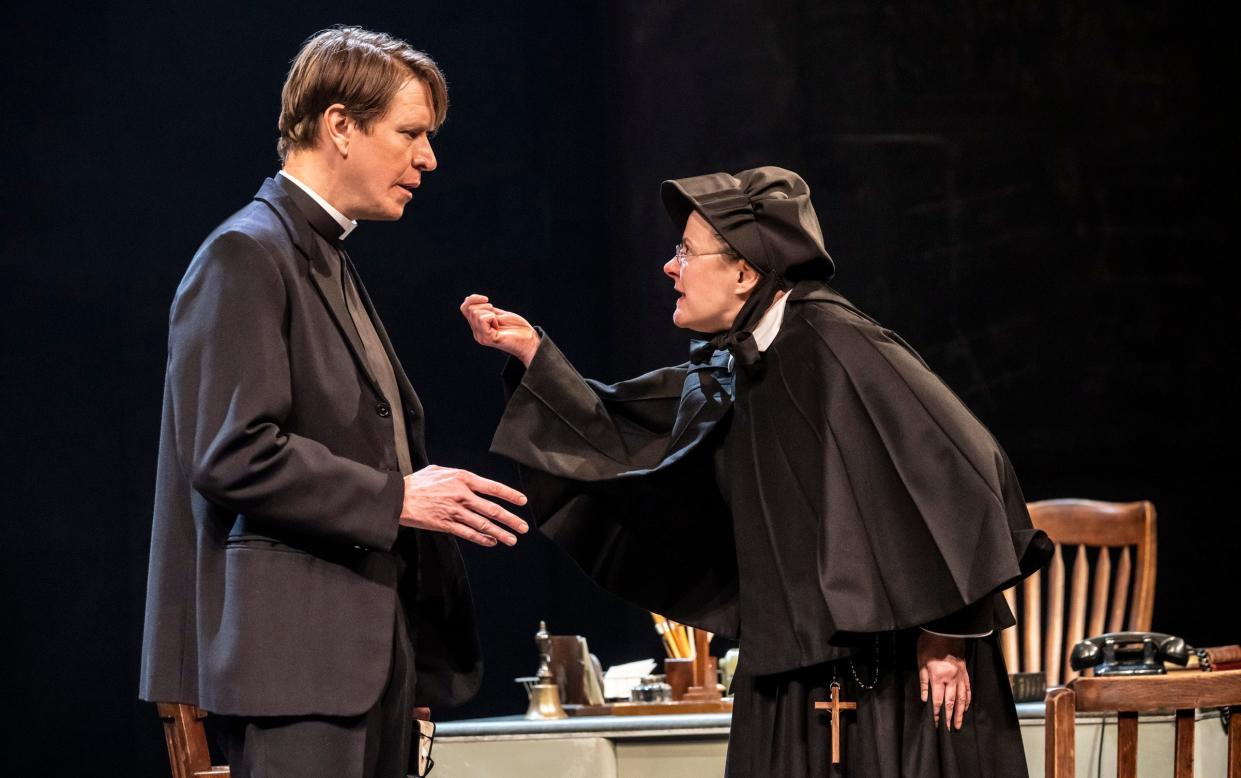Doubt, Chichester Festival Theatre, review: a parable about the modern Catholic church

“I stopped talking to him for fear of being misunderstood,” says Father Flynn, accused by a nun of having an inappropriate relationship with an altar boy in John Patrick Shanley’s slow-burning play, set in a Catholic boys’ school in the Bronx in 1964. Pivoting between a devastating accusation and its abject denial without favouring one or the other, Shanley’s 2004 Pulitzer Prize-winner is one of the great plays about moral certainty and subjective truth, alongside both Arthur Miller’s The Crucible (1953) and David Mamet’s Oleanna (1992).
Doubt has been revived several times and in different forms, from Broadway productions to a glossy 2008 film starring Meryl Streep and Philip Seymour Hoffman, and it’s tempting to see it as a piece of gladiatorial sport: a play that sends its audience home still arguing over whether the priest is or isn’t guilty. Yet, nearly 20 years on from its premiere, it now feels like a prescient parable for the nightmare of Twitter, in whose censorious crosshairs anyone can become caught at any moment, and in which accusations have become entrenched as forms of proof. These days, we are all Father Flynn.
Lia Williams’s gripping production, which stars the excellent Monica Dolan as the ratchet-faced accuser Sister Aloysius, feels both out-of-time and socially specific. The school in which it takes place, just a year after the assassination of John F Kennedy, combines an Old Testament atmosphere with forward-looking momentum; the starchy, bonneted garb of Aloysius and the younger nun, Sister James (Jessica Rhodes), are like something out of a gothic morality tale, while the clean lines of Joanna Scotcher’s set, with its dominating backlit cross, suggest a funky modernist church.
It’s here, in a succession of fast-moving, tightly coiled scenes, that Dolan’s disarmingly wisecracking yet thoroughly mirthless Aloysius mounts her campaign against Sam Spruell’s youthful, progressive priest, who plays basketball with the kids and delivers sermons on the nature of doubt. Her only evidence is a gut instinct that he has become too close to the school’s only black pupil, Donald Muller, whom we never see. The audience is first horrified by her monstrous self-righteousness, then given cause to wonder whether she is indeed right. Twisting the dial further is Donald’s mother, Mrs Muller (Rebecca Scroggs, terrific), who, in an electrifying scene with Aloysius, hints that she not only knows about the implied relationship but, aware of her lonely son’s sexual persuasion, has implicitly sanctioned it.
Williams’s subtle, slippery production deftly allows for the possibility that Aloysius’s belief and Flynn’s protestations of innocence may on some level both be true. Spruell’s boyish Flynn, for instance, whose “let-it-all-hang-out” demeanour is far better suited to the changing mood of the times than Aloysius’s spartan faith in deference and discipline, cuts a plausible figure as a man for whom a close relationship with a vulnerable pupil might feel like an entirely innocent, even laudable thing. At the same time, the seductive allure of certainty itself is put on trial. Dolan, whose Aloysius is not so much a religious zealot as a withered woman without any discernible interior life, persuasively makes the case not for why such a woman might be unquestionably right, but why she might crave the purpose and power that moral righteousness can bring.
Shanley’s own position is clear, in that his play argues for doubt itself as a legitimate philosophical and spiritual stance. Doubt is indeed a parable, in that it primarily uses its characters to illustrate an idea, yet it also demands – as Flynn himself pleads of Aloysius – that we see them as people just like ourselves, capable of holding multiple truths at once. Yet it also leaves plenty of room for the audience to doubt whether embracing shades of grey is itself always the best solution: after all, the play is fully aware that the Catholic Church has needed more Sister Aloysiuses over the years, rather than less. But then again, it asks, what about poor Donald, whose homophobic father apparently beats him, and who, in losing the possibly innocent Father Flynn, might lose his only friend? You decide. Or rather, don’t.
Until February 5. Tickets: 01243 781312; cft.org.uk

